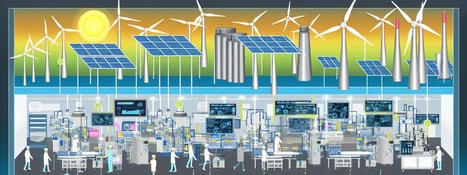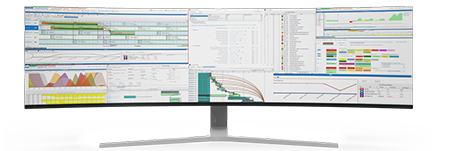Production Planning for Sustainable Energy Consumption
In today's rapidly evolving world, sustainability has become a top priority for businesses across various industries. Medical manufacturing facilities are no exception. One critical aspect of sustainability in these facilities is energy consumption. Efficient production planning not only ensures timely delivery of high-quality medical products but also plays a significant role in reducing energy consumption and minimizing the carbon footprint.
In this blog, we will explore the concept of production planning for sustainable energy consumption in a medical manufacturing facility. We will also discuss the integration between PlanetTogether, a powerful production planning software, and prominent ERP, SCM, and MES systems such as SAP, Oracle, Microsoft, Kinaxis, Aveva, and others, to achieve optimal results.

The Significance of Sustainable Energy Consumption
Before looking into production planning strategies, it's essential to understand why sustainable energy consumption is crucial for medical manufacturing facilities.
Environmental Responsibility: Medical manufacturing is energy-intensive, and traditional manufacturing practices can have a significant environmental impact. Reducing energy consumption not only reduces greenhouse gas emissions but also contributes to a company's commitment to environmental responsibility.
Cost Savings: Energy costs are a significant expense for any manufacturing facility. Implementing sustainable energy practices can lead to substantial cost savings over time, improving the bottom line.
Regulatory Compliance: Many regions and countries have stringent regulations related to energy consumption and emissions. Complying with these regulations is not just a legal requirement but also a reputation-building measure.
Competitive Advantage: Companies that adopt sustainable practices often gain a competitive advantage in the market. Consumers and investors increasingly prefer eco-friendly products and companies.


Integrating PlanetTogether with ERP, SCM, and MES Systems
To achieve sustainable energy consumption in medical manufacturing, it is essential to have a robust production planning system in place. PlanetTogether is a state-of-the-art production planning software that offers advanced features for optimizing production schedules. However, to maximize its effectiveness, integration with ERP, SCM, and MES systems is crucial. Let's explore the benefits of this integration:
Enhanced Data Visibility
Integrating PlanetTogether with systems like SAP, Oracle, Microsoft, Kinaxis, Aveva, and others allows for seamless data exchange. This means that production planners have real-time access to critical data, including inventory levels, order statuses, and equipment availability. With comprehensive data visibility, planners can make informed decisions to optimize production schedules and minimize energy usage.
Accurate Demand Forecasting
Accurate demand forecasting is a cornerstone of sustainable production planning. ERP systems excel at gathering historical sales data and market trends. When integrated with PlanetTogether, this data can be used to create precise production schedules that align with actual demand. This minimizes overproduction and reduces energy waste.
Efficient Resource Allocation
MES systems provide valuable insights into equipment performance and resource utilization on the shop floor. When integrated with PlanetTogether, this data can be used to allocate resources efficiently. For example, if a particular machine consumes a significant amount of energy, the production schedule can be adjusted to minimize its usage during peak energy cost hours.
Real-time Energy Monitoring
Integration with advanced MES systems can enable real-time energy monitoring. This means that production planners can track energy consumption at different stages of manufacturing. By analyzing this data, they can identify energy-intensive processes and explore ways to optimize them.
Adaptive Planning
In today's dynamic business environment, adaptability is key. Integration between PlanetTogether and ERP, SCM, and MES systems allows for adaptive planning. When unexpected disruptions occur, such as supply chain delays or equipment breakdowns, the production schedule can be quickly adjusted to minimize energy waste and maintain production efficiency.

Strategies for Sustainable Energy Consumption in Production Planning
Now that we understand the importance of sustainable energy consumption and the benefits of integrating PlanetTogether with ERP, SCM, and MES systems, let's explore some strategies for achieving this goal:
Demand-Driven Planning
Shift from traditional forecast-based planning to demand-driven planning. By closely aligning production schedules with actual customer demand, you can reduce energy waste caused by overproduction.
Energy-efficient Equipment
Invest in energy-efficient machinery and equipment. Modern manufacturing equipment is designed to consume less energy while maintaining high productivity levels. Consider retrofitting older machines or replacing them with more energy-efficient alternatives.
Off-Peak Energy Usage
Schedule energy-intensive processes during off-peak hours when electricity costs are lower. Integrating with ERP systems can help identify these optimal time slots.
Renewable Energy Sources
Explore the use of renewable energy sources such as solar panels and wind turbines to power your manufacturing facility. Integrating data from these sources with PlanetTogether can help optimize production schedules based on available renewable energy.
Continuous Improvement
Implement a culture of continuous improvement. Regularly review energy consumption data and production processes to identify areas for optimization. Encourage employee involvement in sustainability initiatives.
Production planning for sustainable energy consumption in medical manufacturing facilities is not just a noble goal but a strategic imperative. Integrating advanced production planning software like PlanetTogether with ERP, SCM, and MES systems enables efficient resource allocation, demand-driven planning, and real-time energy monitoring.
By adopting these strategies and embracing sustainability, medical manufacturers can reduce their environmental impact, lower costs, and gain a competitive edge in the market. The future of medical manufacturing lies in the hands of those who prioritize both quality and sustainability.
Are you ready to take your manufacturing operations to the next level? Contact us today to learn more about how PlanetTogether and integrated scheduling solutions can help you achieve your sustainability goals and drive success in the medical industry.


